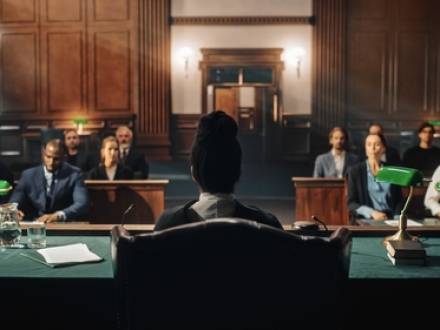What to Expect at Your First Divorce Court Hearing in Illinois
 The first time you appear in court for your divorce can feel intimidating. Your first divorce court appearance sets the tone for how the rest of your case will go, and you may not know what to wear, how to act, what will happen, or how long it will take. Understanding what to expect, both legally and logistically, can make the experience far less stressful.
The first time you appear in court for your divorce can feel intimidating. Your first divorce court appearance sets the tone for how the rest of your case will go, and you may not know what to wear, how to act, what will happen, or how long it will take. Understanding what to expect, both legally and logistically, can make the experience far less stressful.
As of October 2025, Illinois divorce cases continue to follow the procedures outlined in the Illinois Marriage and Dissolution of Marriage Act. While every county has its own local rules, the process in DuPage County generally follows a predictable sequence. The more you understand before you arrive, the more confident you will feel when you stand before the judge. Our Wheaton divorce attorneys can prepare you for your first hearing and for everything that happens before and after.
What Happens Before the First Family Court Hearing
Before your first court date, your attorney will prepare and file the necessary documents with the clerk of the circuit court in DuPage County. The main documents include:
-
Petition for Dissolution of Marriage: This is the legal document that officially starts your divorce case.
-
Summons: This tells your spouse that a divorce case has been filed and gives instructions for what they need to do next.
-
Financial Affidavit: This is a required form disclosing your income, expenses, assets, and debts.
Your spouse must be served with these documents before the first hearing can take place. Once service is confirmed, the court will assign a case number and schedule your initial hearing, usually within 30 to 60 days. In DuPage County, many hearings take place at the DuPage County Judicial Center, located at 505 N. County Farm Road in Wheaton. Check your notice of hearing for the exact courtroom number and time.
Your attorney will typically meet with you before the hearing to go over what to expect, review any filings, and discuss how to respond if the judge asks you direct questions.
What Is the First Divorce Hearing For?
Your first court appearance in a divorce is often called the initial status hearing or case management conference. This is not usually when the judge finalizes your divorce. Instead, it is a chance for the court to review your case, make sure all paperwork has been filed, and deal with any temporary matters that cannot wait until the divorce is finalized.
The judge will review what issues are contested, such as child custody, child support, asset division, and living arrangements. If the divorce is uncontested, your first hearing may be brief. If disagreements exist, the judge may set deadlines for discovery, mediation, or temporary support hearings.
Most initial hearings last only 10 to 30 minutes, though crowded dockets can extend wait times. Complex cases may take longer. Your attorney will stay with you throughout the process to explain what is happening and what to expect next.
What Will Happen During a Divorce Hearing?
When you arrive at the DuPage County courthouse, you will pass through security and check the monitors in the lobby to confirm your courtroom number. Plan to arrive at least 20 to 30 minutes early. If you have an attorney, they will handle most of the speaking. Here is what typically happens:
The Judge Calls the Case
When your case is called, you and your spouse (and your attorneys, if you have them) will step forward. The judge will verify your names, confirm service, and ask whether each party has reviewed the petition and filed a response.
Review of Case Status
The judge will ask if the divorce is contested or uncontested. If both parties agree on all issues, the case may be set for a final prove-up hearing within a few weeks. If disputes exist, the judge will issue a scheduling order for discovery, mediation, and potential temporary hearings.
Temporary Orders
If necessary, your attorney may request temporary orders, which can address matters like child support, alimony, parenting time, or who can live in the marital home while the divorce is pending. These orders remain in effect until the final judgment.
Mediation or Parenting Classes
For parents, Illinois law requires completion of a parenting education program before the divorce can be finalized. The judge may also order mediation to resolve parenting disputes. Mediation is private and can help parents reach agreements without further litigation.
Scheduling Future Dates
The judge will likely schedule a case management conference, discovery deadlines, and status hearings. You will receive a copy of the scheduling order before leaving court.
What to Wear to Divorce Court
Courtrooms in Illinois expect a professional environment. How you present yourself communicates respect to the judge and the seriousness with which you approach your case. Dress conservatively and neatly. Business-casual or professional clothing is appropriate. Avoid jeans, shorts, t-shirts, flip-flops, or revealing attire.
For men, a collared shirt and slacks (or a suit if available) are ideal. For women, a blouse and dress pants, or a modest dress, are appropriate. Remove hats and turn off your phone before entering the courtroom. While judges do not decide cases based on appearance, dressing appropriately helps make a positive impression.
After the Divorce Court Hearing
Following your first court date, your attorney will implement the court’s orders and get ready for what needs to happen next. Depending on the judge’s instructions, you may need to:
-
Gather financial documents such as tax returns, pay stubs, bank statements, and property records.
-
Participate in mediation or parenting classes if you have children.
-
Comply with temporary custody or support orders.
If your case proceeds to discovery, each side will exchange information about assets, debts, and other relevant details. Your attorney will guide you through this process and help you respond to any formal requests.

What Happens If You Miss a Divorce Court Hearing?
Missing your court date can have serious consequences. If you are the petitioner and do not appear, your case may be dismissed. If you are the respondent, the judge can proceed without your input. Always contact your attorney immediately if an emergency prevents you from attending a scheduled hearing.
Contact a DuPage County, IL Divorce Attorney
If your first divorce court hearing is coming up, knowing what to expect can ease your mind and help you make the most of it. At Goostree Law Group, we have spent decades guiding clients through every stage of the Illinois divorce process. Contact a Wheaton, Illinois divorce lawyer at 630-584-4800 today to schedule your free consultation.












